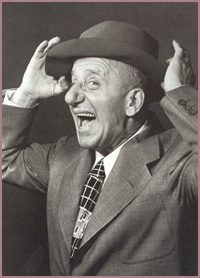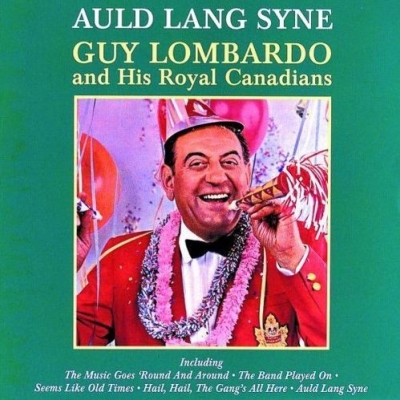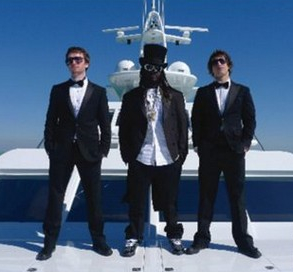[Bianculli here: Yesterday, guest columnist Tom Brinkmoeller came down on one side of a hot-button current journalistic issue, whether "vintage" references in stories were helpful or irritating to readers, especially those much-coveted younger ones. Today, another of our new TV WORTH WATCHING correspondents, P.J. Bednarski, takes the opposing view.
I'd make a "Jane, you ignorant slut" joke here -- but since that Dan Aykroyd retort to Jane Curtin on "Weekend Update" from Saturday Night Live is over 30 years old, that's sort of the point at hand. So read P.J. (and, if you missed yesterday's post, Tom), then weigh in yourself...]
Forget the Past: It's Like, History
By P.J.Bednarski
When J. Max Robins became the editor in chief of Broadcasting & Cable magazine in 2004, his role was to goose the place into the 21st century. He often told us that before he took over, he had read a lead in the magazine that referred to Jimmy Durante, and that was a cultural reach-back that bothered him a lot. B&C was just too damn old to appeal to younger readers. By making hipper references, B&C circulation briefly spiked past Maxim, before readers noticed that the stories were still about subjects like "cable must-carry" and "multicasting," and things went back to normal.

The offending lead: "As Jimmy Durante was fond of saying, 'Everybody wants to get into the act!'" was written in 2003. Jimmy Durante, actor, vaudevillian, guy with a big nose, always signed off performances with "Good night, Mrs. Calabash, wherever you are," and he died in 1980.
The fact is, Robins was right to at least make reporters make more contemporary references, and Editor & Publisher is on solid ground suggesting that newspapers could get a little more hep, daddy-o. After all, the Catholics quit performing the Mass in Latin more than 40 years ago, and Latin was a dead language for quite a long time before that. Talk about being the last network to go HD.
But we live in a time of throwaway information, with disposable stars, victims and even reputations, and now, through American Idol and You Tube, there are even shortcut pipelines to fame. It's also as fleeting as possible. Journalists should know history; so should regular old people. But it's out of fashion. Those who forget history are bound to repeat it. Those who remember history are bound to get bored stares.
Oh, we lucky, pitiful Baby Boomers; we grew up in two worlds between a great war and a great upheaval, mainly created by our parents, who spawned like rabbits. We knew Bob Hope. He wasn't the least bit funny, but we knew that at one time, he was. We knew, or knew about, Edward R. Murrow, Charles Lindbergh, Joe  McCarthy and Timothy Leary, Billy Graham, napalm, Elvis Presley and The Pill. And yet, well into my 20s, after the Rolling Stones, acid, the summer of love, Vietnam, Woodstock, the Manson Family and Kent State, new year's eve on TV still meant Guy Lombardo and the Royal Canadians. Though our world was certainly not at peace, generationally or otherwise, anomalies abounded. Which had bonuses. It's how I listened to Dusty Springfield, Frank Sinatra and Smokey Robinson and the Miracles, all on the same radio station, and there was a newscast every hour that actually reported news.
McCarthy and Timothy Leary, Billy Graham, napalm, Elvis Presley and The Pill. And yet, well into my 20s, after the Rolling Stones, acid, the summer of love, Vietnam, Woodstock, the Manson Family and Kent State, new year's eve on TV still meant Guy Lombardo and the Royal Canadians. Though our world was certainly not at peace, generationally or otherwise, anomalies abounded. Which had bonuses. It's how I listened to Dusty Springfield, Frank Sinatra and Smokey Robinson and the Miracles, all on the same radio station, and there was a newscast every hour that actually reported news.
The Internet, and cable, changed all that. Once, networks and newspapers set the agenda. They were institutions. They're going away.
The speed of pop culture and its pure abundance has made less mean a lot more. On the other hand, it's over quicker; here today, gone by this afternoon. So, as E&P says, if you're going to make references, they'd better be fresh ones. The fame-making machine is a remarkable display of the speed of newsworthy shock followed quickly, very quickly, by inevitable blah.
Last week, a young, good friend sent me the video link to The Lonely Island's I'm on a Boat, with lyrics like these:
Fuck land, I'm on a boat, motherfucker (motherfucker)
Fuck trees, I climb buoys, motherfucker (motherfucker)
I'm on the deck with my boys, motherfucker (yeah)
This boat engine make noise, motherfucker

And so on. The Lonely Island is a comedy group, also known for videos Dick in a Box and Jizz in My Pants, and helped along by Saturday Night Live. Fuck isn't very shocking anymore. I'm not even shocked by the banality. But I am amazed by the popularity of it. You can get I'm on a Boat as a ringtone, and as of Friday, the video has been viewed 18,215,531 times on YouTube. Assume for a second it's funny. Is it 18.2- fucking-million funny? No, it isn't.
And when a TV critic recalls that in 1990, the short-lived CBS sitcom Uncle Buck made headlines when one of its young characters exclaimed "You suck!" the how-times-change notation only makes a difference to those who remember when there was a mainstream culture, or corporate or moral gatekeepers. Now, who cares? History is over. Everybody's famous for five minutes, and forgotten three minutes later. Good night, Mr. Durante, whoever you are.
----

P.J. Bednarski is a veteran TV critic and former executive editor of Broadcasting & Cable magazine.